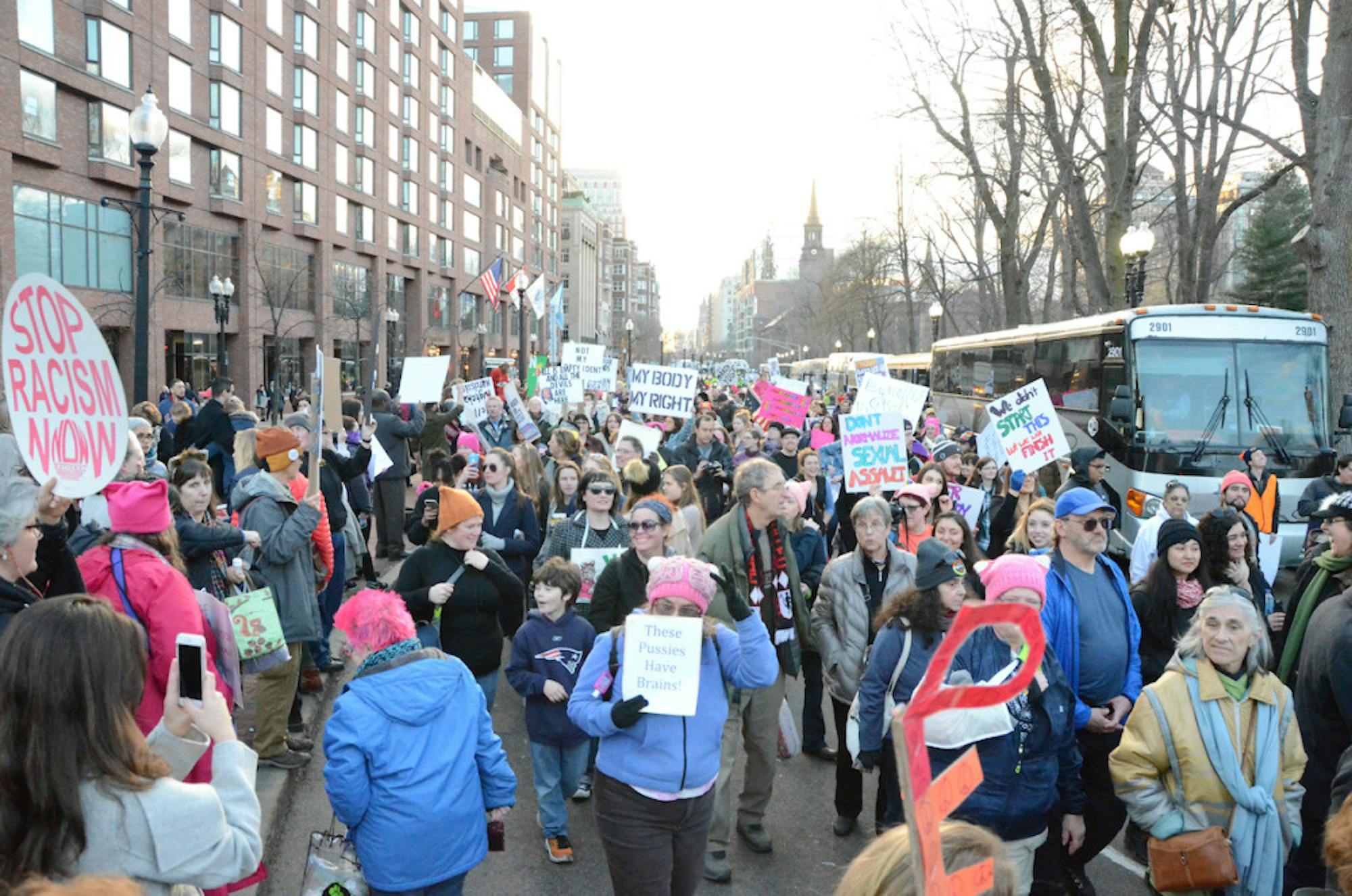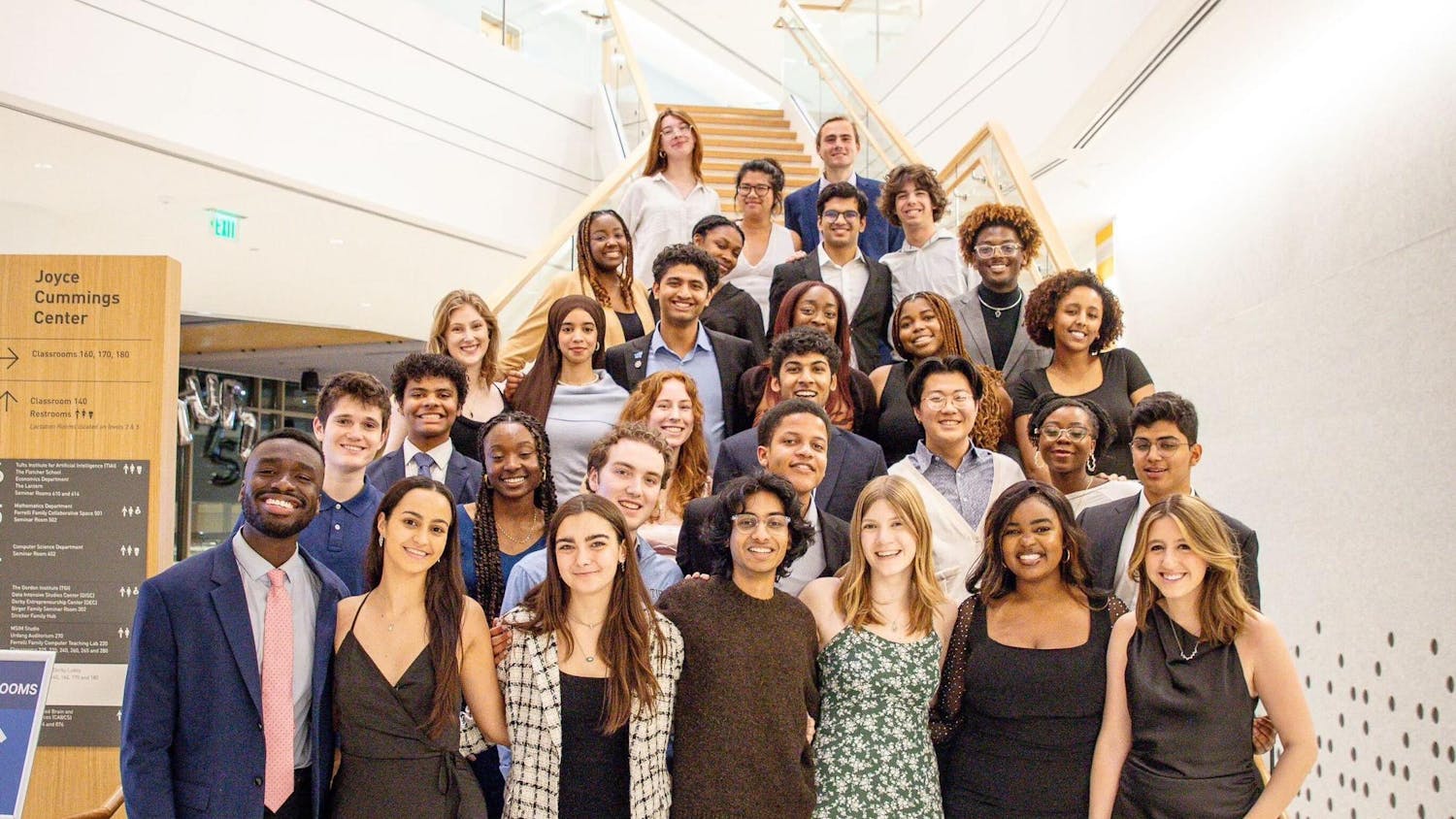Tens of thousands of people marched through Downtown Boston for the Boston Women’s March for America on Saturday, in protest of President Donald Trump’s inauguration the day prior.
The march, according to its website, was inspired by the Women’s March on Washington, with the mission of “[uniting] in Boston to march in solidarity with communities most affected by the hate, intolerance and acts of violence being perpetrated throughout the nation.”
According to the Boston Globe, the Boston marchers, estimated to number 175,000, walked from Boston Common to Clarendon Street and back.
A group of Tufts marchers was organized by seniors Mackenzie Merriam and Nandita Baloo, with assistance from the Women’s Center.
“For a lot of people, it was really hard to get to D.C. because of [lack of] transportation and the cost of transportation and housing and all that kind of stuff, so we tried to get people to focus their energies on coming to the Boston one,” Merriam said.
The Friday before, Merriam and Baloo hosted an open house for four hours at the Women’s Center so marchers could bond and make signs, they said.
“It was a community space for people to get together ... if they didn't know people who were going. They could meet with people and just kind of talk,” Merriam said. “Also, the inauguration was going on at the same time so if people didn't [want to] watch it alone, we could watch together and talk about it and vent a little to each other.”
During the march, groups sometimes shouted slogans such as “si se puede, yes we can,” “tell me what democracy looks like, this is what democracy looks like” and “one planet, one people.”
Some of the marchers held signs adorned with slogans, images and statements that were either in favor of various causes or critical of Trump.
Shaalini Ramanadhan held a sign showing the Republican Party symbol -- a red, white and blue elephant --inside a womb next to the words, "The Elephant in the Womb."
“I am an OB-GYN resident, so I feel like access to contraception and access to abortion is very important," Ramanadhan said. "I feel like all that is under threat with the change in the political environment that we have now, so I feel like it's very important to just remind people that it's not something that we can take for granted, and we have to continue to fight for it."
Victoria Chapman, whose poster read, “Who you gonna call? Your representatives!," hoped the day could serve as an educational experience for her daughter, whom she brought along to the march.
"I just wanted to get her to experience what a rally like this is like and [learn] how it's important to speak up for your rights," Chapman said.
April Bedunah wore a shirt with Trump and Vice President Mike Pence’s names on it. She disputed that her support for Trump reflected any particular stance on civil rights.
“I think it’s time to stop talking about sides, and we need to talk about one people as Americans,” Bedunah said. “I have many friends that are transgender. I have many friends that are gay. I was actually married to a Muslim, believe it or not. But I support Trump.”
Tufts student Sarah Nechamkin wondered whether the march's breadth of represented causes obscured the event's potential to affect change.
"You're marching for a variety of progressive platforms," Nechamkin, a junior, said. "In a way, it could be seen as this watered down thing that doesn't result in a lot of change. However, I was watching some speeches in Washington, [D.C.] There were some concrete things that they were telling people to do, like support the [American Civil Liberties Union], donate to Planned Parenthood."
Some students raised concerns about potentially problematic elements of the march. Adam Zoll, who otherwise found “solidarity and encouragement” during the march, observed a trend of transphobia in some of the posters used.
“[My housemates and I] realized some signs were somewhat transphobic, most likely unintentionally, in that they confused genitalia with gender,” Zoll, a junior, said.
Additionally, Baloo believed that the rally in Boston was predominantly white.
Meg Kenneally, a junior, agreed with concerns about inclusivity but remained optimistic that future movements could become more aware.
"There were some issues with the march and transphobic rhetoric as well as it being a pretty white space, but I have hope that moving forward, there can be education and improvement on some of the things that were well-intentioned but not executed sensitively," Kenneally said. "The fact that we were all there and protesting with our presence means something at the very least."
Tufts students march in Boston Women's March for America






